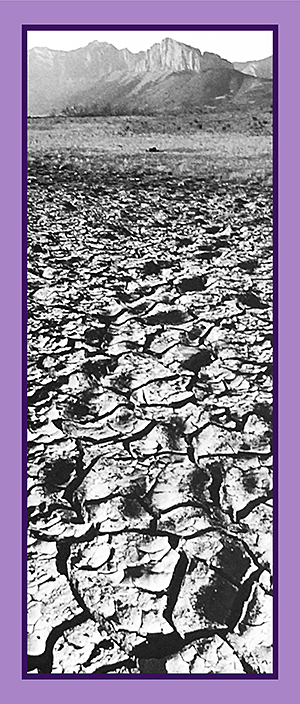Of mudholes and landscapes: seeing terrorism in perspective
COFFEE WITH WARREN, with Warren Harbeck
Cochrane Eagle, March 5, 2015

Up close, life can seem a wilderness, but from above,
it’s just another mudhole along the way.
Photo by Gerald Kaquitts
Some years ago when I was feeling a bit lost in life’s wilderness, my Stoney Nakoda photographer/philosopher friend, the late Gerald Kaquitts, came to my rescue.
He gave me a photo he’d taken outside his home at the west end of Morley, and it really helped me re-embrace life from a more positive perspective. (See my column for Feb. 21, 2007.)
It also suggested wisdom for rising above the mudholes of ISIS and Boko Haram.
In Gerald’s photo, a dry, cracked wasteland dominates the lower three-fourths of the image, with only a hint of the inspiring Mt. Yamnuska in the far distance. In reality, Îyâ Mnathka (“flat rock” in Stoney) was almost at Gerald’s doorstep. He had photographed the scene with an ultra-wide-angle lens at knee height above a dry mudhole only a few metres across. Being so close to the mud magnified its despairing appearance against the seemingly unreachable grandeur beyond.
Gerald’s point in giving me this hope-filled photo was to encourage me to rise above my distress and to see life as an eagle might as it soared overhead – to see life’s mudholes as mere blemishes on the larger landscape of life.
I got to thinking about that photo while attending an interfaith gathering in Calgary this past weekend that brought Jews, Christians, Muslims, Baha’is and others together to express solidarity with the victims of global terrorism and to seek a better way. One of the speakers was none other than Calgary’s world-class mayor.
Hosted by the Islamic Supreme Council of Canada, the evening was convened by its founder, Imam Syed Soharwardy, our longtime coffee companion who also founded Muslims Against Terrorism.
The kidnappings, beheadings, and “attacks on mosques, churches and synagogues in Africa, Europe, Middle East, USA, Canada and Pakistan are acts of violence and condemned by the people of all faiths,” Imam Soharwardy declared.
“Every human life is important. The whole foundation of Islam is based on the sanctity of life.”
That sanctity of life even trumps religious observances, he continued. “Even during prayer, if a person needs help, we must stop prayers and help them.”
These terrorists “do just the opposite of what Islam stands for.”
Several speakers noted “the clash of ignorance” that underlies so much of this violence and revenge.
Dr. Shaul Osadchey, rabbi at Calgary’s Beth Tzedec Synagogue and a frequent contributor to our columns, agreed. “We have a more important weapon; we have the weapon of knowledge. We have to commit ourselves to religious literacy.”
And this is where face-to-face friendships are so important, he said, especially in view of the media stereotypes that plague us.
“Who is wise? The person who learns from everyone.”
Yes, added Mayor Naheed Nenshi, “we have to fight small-mindedness. Every single one of us has a stake in the others around us.”
After all, faith is “not rigid ideology, but a way of looking at the world. Faith is love,” he stressed. “We who are people of faith have so much more that unites us than divides us.
“We need to resist the urge to be insular. We’re all in it together. Our neighbour’s strength is our strength. Our neighbour’s pain is our pain.”
Resisting the urge to be insular was a theme emphasized by most of the speakers that evening. The seeds of radicalization are too often sown through marginalization and isolation. And this is where all of us can do a better job of reaching out to our neighbours across religious and ethnic lines.
It’s also what I hope these columns are about: to celebrate the common good among our common humanity, and like eagles, not judge all of life by the mudholes along the way.
© 2015 Warren Harbeck
JoinMe@coffeewithwarren.com